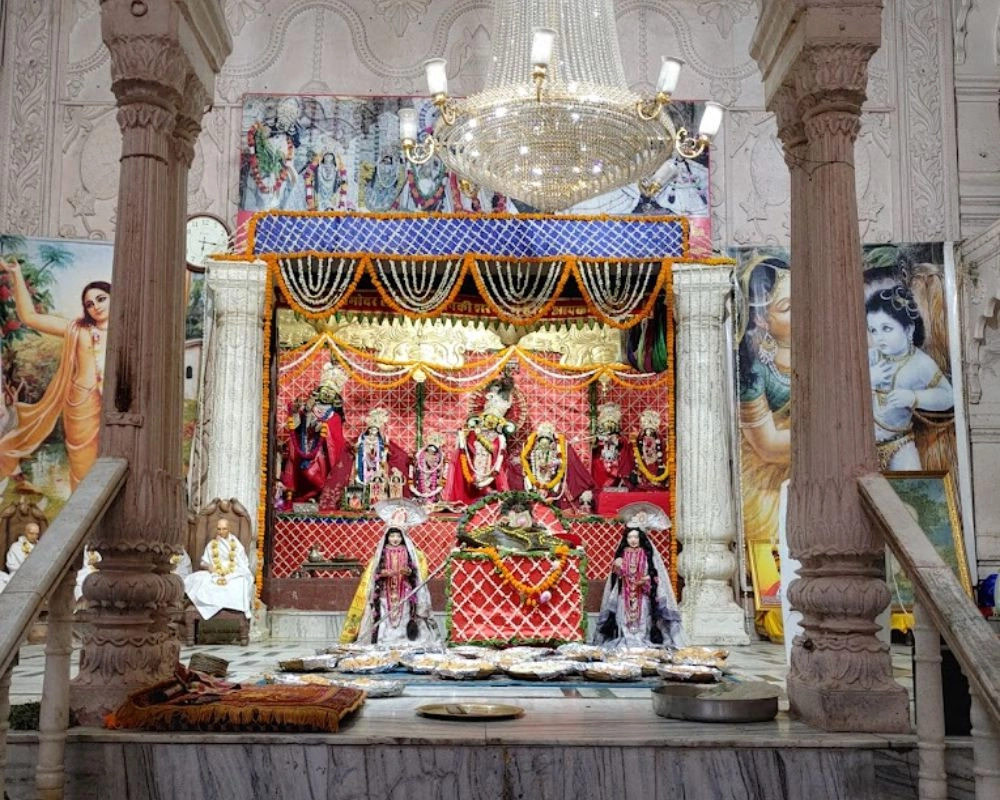Prem Mandir
Nestled in the sacred town of Vrindavan, Uttar Pradesh, Prem Mandir (Temple of Love) stands as a maj...

Vrindavan, the land of divine love, is dotted with temples that narrate the eternal pastimes of Radha and Krishna. Among them, the Radha Damodar Temple holds a very special place. Founded by the great saint Srila Jiva Goswami, this temple is not only a center of devotion but also a treasure trove of Gaudiya Vaishnavism's history and philosophy.
A visit to Radha Damodar Temple is like stepping into a divine sanctuary where devotion, scholarship, and Krishna’s eternal leelas blend seamlessly.
The Radha Damodar Temple was established in 1542 AD by Srila Jiva Goswami, one of the six prominent Goswamis of Vrindavan and the nephew of Srila Rupa Goswami. He was instructed by Lord Chaitanya Mahaprabhu to uncover the lost holy places of Vrindavan and establish temples to spread the Bhakti movement.
Jiva Goswami personally installed the deity of Radha Damodar, carved and gifted to him by Rupa Goswami himself. The name "Damodar" refers to Lord Krishna being tied by the waist with a rope by Mother Yashoda, symbolizing his childlike innocence and the love of his devotees.
The presiding deities of the temple are Sri Sri Radha Damodar – a beautiful pair of Radha and Krishna. The deities are small but exquisitely carved and hold deep spiritual power.
Alongside the main deities, the temple also houses Shaligram Shilas (sacred stones), including the famous Govardhan Shila given by Lord Krishna to Sanatana Goswami, bearing the imprint of His lotus feet. This sacred stone is worshipped daily and draws thousands of pilgrims.
The Radha Damodar Temple, though not as towering as others in Vrindavan, carries a timeless elegance. The temple is built in traditional North Indian style, with:
A central courtyard surrounded by rooms for saints and visiting devotees.
A clean marble floor with space for sitting and chanting.
A samadhi shrine of Srila Jiva Goswami located within the temple compound.
Each corner of the temple reflects peace, dedication, and a strong spiritual presence, maintained through centuries of devotion.
Radha Damodar Temple holds immense significance for followers of the ISKCON (International Society for Krishna Consciousness) movement. Srila A.C. Bhaktivedanta Swami Prabhupada, founder of ISKCON, lived here in the 1950s and 1960s, in a small room facing the courtyard.
It was in this room that Prabhupada began writing the first volumes of the English translation and commentary on the Srimad Bhagavatam—a monumental work that laid the foundation for Krishna consciousness around the world.
Today, his room is preserved as a memorial, and ISKCON devotees from across the globe visit it to pay homage and feel inspired by his unwavering devotion and mission.
The temple follows a very devotional and traditional schedule of worship. Daily rituals include:
Mangala Aarti (early morning worship)
Shringar (decorating the deities)
Bhoga (food offerings)
Evening Aarti and Kirtan
Chanting of the Hare Krishna Mahamantra constantly resonates in the temple, creating a meditative and blissful environment.
Radha Damodar Temple celebrates all major Vaishnava festivals with grandeur, including:
Radhashtami – Appearance of Shri Radha
Janmashtami – Birth of Lord Krishna
Govardhan Puja
Kartika Month Celebrations – Including Deep Daan, Tulsi Puja, and Govardhan Parikrama
During Kartik (October–November), the temple sees an influx of devotees from across the world. The Radha Damodar Parikrama, a sacred circumambulation around the temple courtyard, is performed as it is believed to be equal in merit to doing the Govardhan Parikrama.
Location: Located in the Seva Kunj area of Vrindavan, close to other historic temples like Banke Bihari Mandir and Radha Raman Mandir.
Timings: Open from 4:30 AM to 12 PM and 4 PM to 9 PM.
Best Time to Visit: During Kartik month, Radhashtami, or early morning aarti hours for a serene spiritual experience.
Nestled in the sacred town of Vrindavan, Uttar Pradesh, Prem Mandir (Temple of Love) stands as a maj...
Nestled in the narrow, vibrant lanes of Vrindavan, Uttar Pradesh, the Banke Bihari Temple is one of ...
Rising in the heartland of Lord Krishna’s birthplace, Vrindavan Chandrodaya Temple is not just a tem...
The ISKCON Temple, often recognized by its beautiful domes, serene atmosphere, and the enchanting ch...
